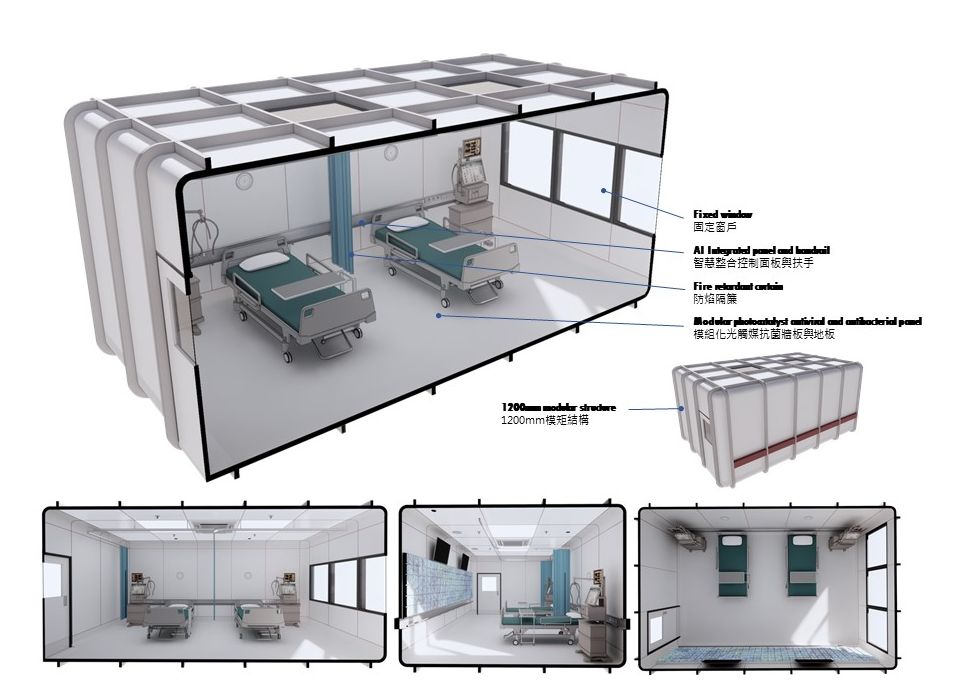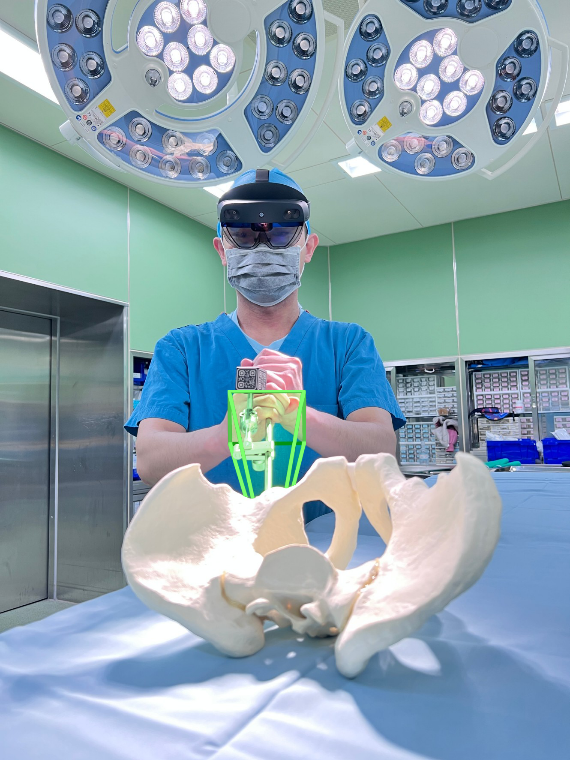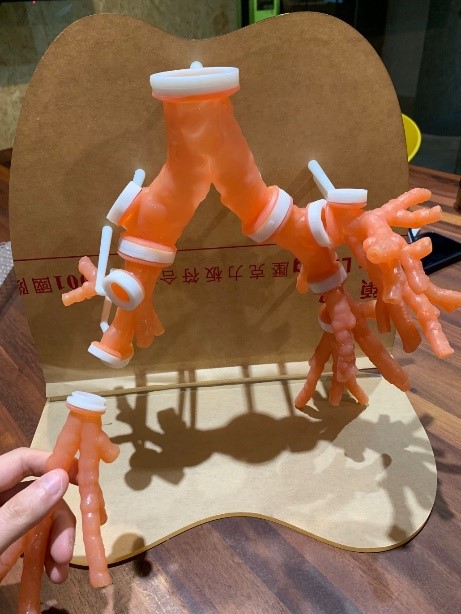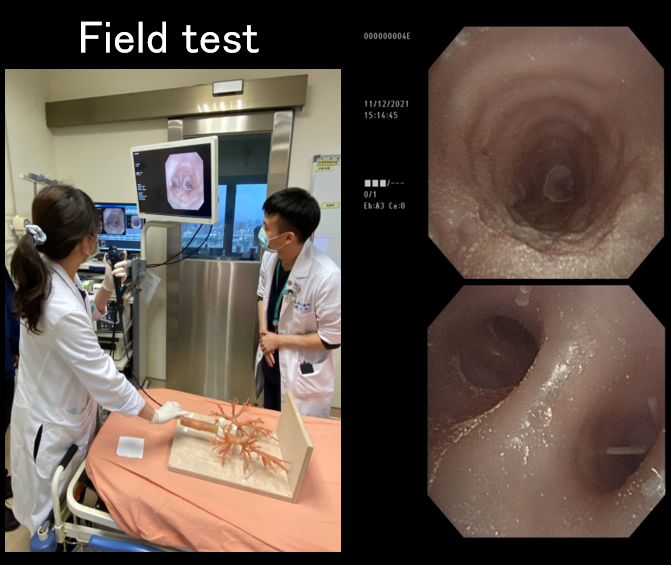
Fu Jen Catholic University Hospital have identified 50 clinical needs through interdisciplinary collaboration (Photo by FJCUH)
Since its establishment, Fu Jen Catholic University Hospital (FJCUH) has actively introduced various smart systems and advanced technologies. With a patient-centric approach, the hospital set up the Center for Innovation (CFI), which has identified nearly 50 clinical needs. The MAC WARD Smart Epidemic Prevention Ward, which was launched in 2021 and incorporates the Internet of Things, won the National Innovation Award. After the pandemic, the hospital further developed the MAC WARD 2.0, equipped with negative pressure isolation modules. Through interdisciplinary collaboration, CFI is bringing out more outstanding and distinctive products, which will display at the 2023 Healthcare+ Expo.
The Center for Innovation (CFI) Taking Research to Solutions
Fu Jen’s Center for Innovation (CFI) is the only innovation center in Taiwan guided by design principles and centred around the patient experience. It brings together multidisciplinary teams of professionals in healthcare, nursing, law, and more to challenge traditional hospital culture. CFI identifies unmet clinical needs, analyses, discusses, proposes solutions, and develops innovative projects.
Using a "design thinking" approach, CFI inspires and drives collaboration across departments, disciplines, and levels, fostering continuous innovation and improvement at Fu Jen Catholic University Hospital. The effective use of clinical solutions aims to enhance the overall health of the Taiwanese population and patients, leveraging the hospital's strategic location surrounded by the Wugu Industrial Park to contribute to local development.

The Center for Innovation of FJCUH is the only design-thinking, patient-centric facility in Taiwan (Photo by FJCUH)
Since the CFI's inception, a series of training sessions have been held and dozens of core members have been identified. Regular brainstorming sessions have led to the discovery of numerous unmet clinical needs within two years. Recognising the shortcomings of university incubators in technology transfer, Fu Jen Catholic University has established a dedicated technology transfer office. The funds generated through technology transfer can be consistently reinvested in research and development for sustainable operations. While the development of medical devices is not a new technology, there is no denying the flourishing prospects of the healthcare industry in the era of precision medicine. The CFI will continue to bring together individuals from different sectors to participate in innovative medical device research and development, contributing to the creation of a high-quality medical device industry.
MAC WARD: Contactless, IoT-equipped
During COVID-19, FJCUH collaborated with Taiwan Design Research Institute and Miniwiz Co., Ltd. to jointly develop the world's first intelligent ward module - MAC WARD. After the pandemic, the negative pressure isolation ward module, also called MAC WARD 2.0, can be installed in existing wards, hospitals, homes or outdoors. This allows the original general ward to be used not only as a regular isolation ward, but also to be quickly transformed into a negative pressure or intensive care ward. This design not only maximises the use of ward space, but also reduces the waste of manpower, time, resources and space caused by temporary set ups, while reducing the risk of transmission.

The MAC WARD can be assembled and dissembled at any time (Photo by FJCUH)
The 12th floor of the hospital is entirely MAC WARD-designed. In particular, the six MAC ICU rooms have been designed in collaboration with local and international manufacturers. These rooms use advanced physiological monitors and ventilators that can be remotely operated and controlled from outside the ward. IoT information security technology and high-end cameras provide real-time connectivity to monitor the patient's condition and response to adjustments in life-support equipment. In the ICU, intelligent air mattresses are used to simulate caregivers turning patients' faces every two hours, reducing the risk of pressure sores for patients in the prone position.
Bedside dashboards has been replaced by an information system that integrates the different information needs of doctors and nurses regarding patient conditions. Future collaborations with domestic manufacturers aim to develop automatic remote patient temperature measurement, along with the integration of the E-Box smart electrical panel to control lights, curtains and more, achieving a true contactless environment.
AR-VR Simulation for Hip Replacement, Clinical Trials Underway
In hip replacement surgery, the placement angle of the acetabular cup is critical. Without proper placement in the safe zone, there is an increased risk of patient dislocation and early loosening. The hospital is integrating the cutting-edge concept of the metaverse, introducing Augmented Reality (AR) and Mixed Reality (MR) technologies. In collaboration with the National Science Council, Fu Jen University, National Taiwan University of Science and Technology and Tsinghua University, they have jointly developed a visualised, MR-simulated hip replacement surgical training system. The system has received seed funding from the National Science Council's research entrepreneurship program.
This visualised hip replacement simulation system allows surgical trainees to practice and gain proficiency before performing on patients. Intuitive visualisation on the head-mounted display shows the three-dimensional scope of the acetabular cup placement angle and safe zone, enhancing the stability of hip replacement surgery.
As technology advances, some of the most advanced medical devices have moved to AR and even MR to support navigation systems. The development of this surgical simulation training system will be extended to various medical schools and teaching hospitals. Human trials are expected to begin next year to collect more clinical data while working towards obtaining Taiwan Food and Drug Administration and US FDA Class II medical device certifications.

VR-MR technology visualising hip replacement surgery for surgical trainees (Photo by FJCUH)
3D-Printed Lifelike Organs Providing Cost-Effective and Bespoke Options for Training
In the past, medical simulation teaching tools were often expensive. Now, a 3D printing platform developed by Fu Jen Catholic University spin-off company SynTrain Printing Co. Ltd. integrates customer requirements for medical training tools. It adopts a project-based approach to develop 3D customised and highly realistic medical teaching tools.
This platform includes 3D modelling, selection of highly realistic printing materials and customisation of simulated functions. It transforms these into printable solutions and produces actual 3D customised and highly realistic medical educational tools. It can adapt to different organs and textures, overcoming current teaching limitations and gradually increasing the proportion of teaching tools in medical classrooms.


Fu Jen’s 3D printing bespoke service providing alternatives for medical training (Photo by FJCUH)
B2B Opportunities with Fu Jen Catholic University Hospital
Digital Health
| Products/Solutions | Partnership wanted |
|---|---|
| AR-VR simulation for hip replacement training | Clinical trials; tech-transfer; product development |
Innovative R&D
| Products/Solutions | Partnership wanted |
|---|---|
| MAC WARD 1.0 & 2.0 | Software and hardware sales |
| Bespoke 3D printing service | Software and hardware sales |
| The Center for Innovation (CFI) | Call for innovative concepts |
Fu Jen Catholic University Hospital at Healthcare+ Expo 2023
- Thursday, 30 November to Sunday, 3 December
- Booth No. M519a | 4F, TaiNEX 1
